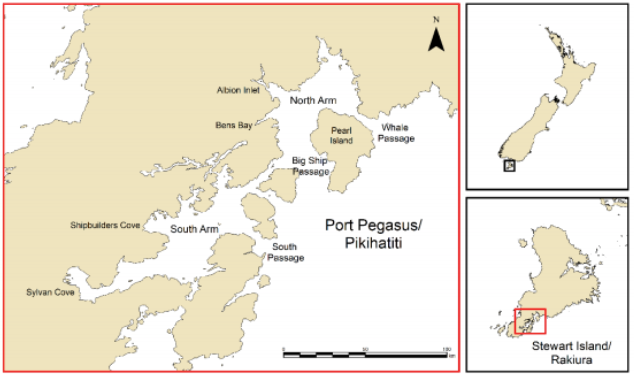An extensive study into a proposal to establish salmon farming at Port Pegasus in Stewart Island has determined the location for aquaculture presents significant challenges for aquaculture.
The Southland Regional Development Strategy (SoRDS) facilitated a study to explore the
environmental, cultural and commercial feasibility of salmon farming in the north arm of Port Pegasus at Stewart Island.
Following a detailed analysis of the scientific data, the Southland Aquaculture Reference Group (SARG) has concluded that aquaculture at Port Pegasus would be difficult at this present time.
According to the feasibility study, a benthic habitat assessment deemed that the area is suitable for aquaculture.
However, an analysis of measured and modelled water currents within internal parts of North Arm shows that it offers moderate current flows, which would require lower production limits and a staged development of production to manage the sea floor and water quality carefully.
Mark O’Connor, New Industries Team Leader for SoRDS, said the study showed the development of aquaculture would deliver a net benefit to the Southland regional economy.
“However, constraints placed on the current configuration of the salmon farm for environmental reasons limit the size of that net benefit to a lower level, and as a consequence, there is a level of economic uncertainty.”
The study also showed Port Pegasus supports a small but growing population of sea lions.
“Following best-practise, fish farm operators would need to demonstrate that management systems can be developed to effectively manage all potential direct and indirect interactions with NZ sea lions.”
The establishment of salmon farming would also adversely affect the landscape and natural qualities of the North Arm of Port Pegasus and of Big Ship Passage, according to the report.
“Aquaculture is a key focus of the SORDS Action Plan, which aims to diversify Southland’s economy, grow the population and strengthen local business,” said Mr O’Connor.
“SoRDS is obviously disappointed that this wasn’t the economic opportunity that was hoped for, but this is the reason why the feasibility study was undertaken. It provides the Southland community with clarity in relation to the Port Pegasus location. It was necessary to help us make an informed decision and move forward with confidence.
Mr O’Connor said it is too early to comment on the next steps: “The feasibility study has only just been completed and our priority is to share the results with the community.
“We would like to take this opportunity to thank SARG members for their valuable contribution and the Stewart Island community for its patience.
“We would also like to recognise the support of Ngai Tahu, the Department of Conservation (DoC), the Ministry for the Environment (MfE), the Ministry of Primary Industries (MPI) and the Ministry of Business, Innovation and Employment (MBIE).”

